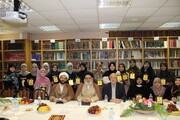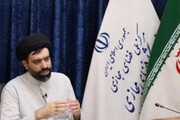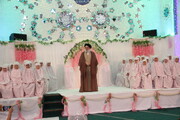Hawzah News Agency – HIWM Seyed Hashem Moosavi in London told IRNA that Muslims make up a significant part of the British population. Then he added: Islam can be the second-largest monotheistic religion and the fastest-growing Abrahamic religion in Britain.
Furthermore, he said that the British Muslim population is projected to reach more than 13 million by 2050. This tendency will depend on the presence of this large Muslim population among non-Muslims.
The Islamic Centre of England’s Director added that the peaceful coexistence of Muslims and non-Muslims together in this country, the presence of a significant number of Muslims in essential administrative and political responsibilities of the country, as well as scientific, educational, religious and cultural activities of Islamic centres and institutions, had created the conditions for this growth to be largely abused, despite the intense Islamophobia propagated by the Western media among non-Muslims and for many of the people of this country, especially elites have a more beautiful picture of Islam in their mind.
The detailed interview with HIWM Seyed Hashem Moosavi is as follows:
Question: Thank you for the opportunity you have given us, please first tell us about the Islamic Centre’s programme, how many audiences you have, what is their background and what are your current activities?
Thank you for paying attention to the activities and programmes of the Islamic Centre of England and preparing a report for it to the valuable audience of this news agency. I hope that the explanations provided will be helpful to your dear readers.
In order to have a clearer picture of the programmes of the Islamic Centre of England, we can divide them into several main and general categories.
The first group are those programmes that are performed continuously, regularly and permanently, which can be referred to as the congregational prayers three times a day, including Morning, Midday and Maghrib, and Dua programmes Tawassul, Komeil, Nudba and other Ziaarats.
The second category is programs that are held in the form of national and religious celebrations or mourning ceremonies for the martyrdom of the Imams (a.s). These programs, such as Muharram, Safar, the Fatemieh days, and special programs related to the holy month of Ramadan, are among the popular and famous programs of the Islamic Centre.
The audience for these two programmes is often the general classes of the immigrant Shi’a community, including men and women, children and adolescents, and Persian, Arabic, Urdu and English language groups. At the same time, we are witnessing the presence of a significant number of new Muslims in this country in such ceremonies.
The third category of the Centre’s programme is offered in the form of an educational programme that can be referred to as the following three essential activities: Mabna School, Tebyan School, and the Hawza Ilmiyya of England.
Mabna School, or “Novid Ayandeh International School”, is a virtual school established by the Islamic Centre of England in cooperation with Tazkieh Educational Institute in Tehran that offers a variety of education for primary school students from first to sixth grade. These pieces of training are organised and planned on three different levels. The possibility of using them is provided for all those interested in the Persian language and Irano-Islamic culture worldwide.
Since establishing the Islamic Centre of England, Tebyan School has been responsible for teaching the Quran, Islamic rulings, ethics, and beliefs for different ages, from adolescents to adults, in Persian, Arabic, and English. The school currently has over 350 students. Those who want to know more about these schools can visit the Islamic Centre website at www.ic-el.UK.
Regarding the Hawza Ilmiyya of England, I would like to briefly say that more than 70 students interested in learning religious sciences are studying in this Hawza at both undergraduate and graduate levels in English. Many of them have completed the course so far. BA (undergraduate course) has graduated from this field and is engaged in Islamic Missionary in some religious centres and mosques.
Regarding the audience of these programmes of the Islamic Centre of England, I must say that these audiences are particular and defined according to their needs.
In the Mabna school section, families who want to stay in touch with Iran, especially the Persian language and are worried about their children are the target of this programme, and the audience of Tebyan school are those Shi’as who are concerned about their children forgetting religious teachings. This school seeks to strengthen the spiritual and scientific foundations of its children.
The Hawza Ilmiyya audience is those Western youths who want to study religious sciences in an entirely spiritual atmosphere and join authentic Islamic sources. The Hawza students are from different countries, including the United States, Canada, the Caribbean, Brazil, Sweden, Norway, the countries of the Persian Gulf, as well as the United Kingdom.
In addition to the three major categories of Islamic Centre’s programmes, a fourth category deals with research and content production.
Publication of the scientific-research journal “Islam and contemporary issues” in English, preparation of the first issue of the scientific-research journal “Miracle of the Qur’an” in English in collaboration with Shahid Beheshti University, preparation of content for publication of 22 volumes of scientific books in the field Contemporary Islamic and religious issues in English, 6 of which were published in full in the year 2021, concluding a memorandum of scientific-research cooperation with Shahid Beheshti University in the field of empowerment of Muslim women and also conducting research in the field of study and pathology Islamic Satellite Networks, a collaboration with the University of Tehran Press on the production of Islamic and religious reference books in English in the UK and dozens of other examples, is part of the Islamic Center of England’s research activities which I briefly mentioned.
Also, holding more than 150 live weekly webinars during the current year (3 webinars per week on Mondays, Thursdays, and Saturdays) in three languages: English, Arabic, and Persian on the topics of “Quran and contemporary topics”, “Lifestyle” Quranic “, and” raising a child “and with the presence and participation of more than ten thousand viewers have been the other activities of the Centre in this field.
In addition to these programmes, we have many other actions and activities that we avoid mentioning in order not to prolong the story.
Question: One of the problems of mosques and Islamic centres in the last two years has been the issue of quarantine and stopping programmes. How did you deal with this? Did you have remote plans?
Yes, as you mentioned, the quarantine issue during the peak of the Covid-19 crisis and the cessation of face-to-face programmes has been one of our serious challenges, which we, fortunately, overcame with special measures and the use of cyberspace facilities.
About six months before the beginning of the Corona epidemic, and when I started my job in this Centre, I talked with some colleagues, especially my friends who were involved in cyberspace. I asked them to provide decent infrastructures for our online activities besides our in-person activities. In the Islamic Centre of England, we can direct some of the activities of this Centre to cyberspace. With this in mind, we started taking the necessary measures and providing the infrastructure required to transfer part of the programmes to cyberspace.
We created a well-equipped studio and signed up or strengthened our social media platforms such as YouTube, Twitter, Instagram, Facebook, and other things that needed to be done. Shortly after this preparation, we were suddenly confronted with the news of the outbreak of the Coronavirus and its aftermath, which shocked everyone, Although we were relatively prepared.
Although not based on previous predictions about the outbreak of Covid-19, this prior preparation had provided us with the conditions that, during the widespread epidemic of Coronavirus and the need to close our Islamic centres, we were able to change many programmes. Not only do we not lose our past attendees on our online programmes, but we also add to a wide range of viewers, including audiences from other countries who were familiar with the English language.
Question: In Iran, we have a relationship between the Imam of the local mosque and the region’s people. This helps to solve people’s problems. The situation here is naturally different. How is your relationship with the worshipers here?
The relationship between the Imam of the congregation and believers is always one of the best types of social relations between human beings because worshipers and believers trust and respect the Imam of mosques and centres. It is one of the most important matters of their lives, namely establishing a relationship with God. Mu’mineen follow their Imams, and this shows the depth of this relationship.
With this introduction, I would like to say that we are no exception to this law in this country. We have very close and good relations with the worshipers and participants in the Centre’s programmes. These good relations have led us to help each other in many cases. For example, in addition to facilitating the conditions for the children of worshipers to study in schools affiliated with the Centre, they also receive other assistance, such as cases in which believers need approval for some matters of their lives, such as educational, cultural or economic departments. Islamic centres are an excellent place for introducing and issuing certificates for such cases.
Of course, the only difference and perhaps the point of our advantage with the country in this regard is that in Islamic countries, people in each region usually go to their local mosque. Still, in this country, due to the lack of mosques and Islamic centres, we see that some worshipers come to the Islamic Centre from miles away every day and participate in its daily or weekly programmes.
Question: How many Muslims does Britain have?
According to statistics released in 2018, Muslims made up more than 3.3 million of Britain’s 67 million people, of which Britain’s share was more than 2.7 million. Five per cent of Britain’s 56 million people. Of course, official and unofficial reports presented in the last one or two years show that this number has reached nearly seven per cent.
The British Shi’a population is estimated at 500,000, mostly living in cities such as London, Birmingham and Manchester, which are primarily of Iranian, Iraqi, Pakistani, Indian and Lebanese nationalities.
Question: What is the attitude of the British people towards Islam?
As I answered in the previous question, at present, Muslims constitute a significant population of the people of this country, and it can be said that Islam is the second-largest monotheistic religion and has the fastest growth among the Abrahamic faiths in Britain based on The British Muslim population is projected to exceed 13 million by 2050. Therefore, the tendency of the British people to Islam will be a function of the presence of this large Muslim population among non-Muslims.
The peaceful coexistence of Muslims and non-Muslims together in this country, the presence of a significant number of Muslims in essential administrative and political responsibilities of the country, as well as scientific, educational, religious and cultural activities of Islamic centres and institutions, all these are conditions. Despite the intense Islamophobia propagated by the Western media among non-Muslims, this preaching has been widely misused. Many of the people of this country, especially the elite community, have a relatively sensible, rational, peaceful and beautiful image of Islam in their minds.
We see many non-Muslims living in this country every week, whether English or non-English, who convert to Islam by visiting the Islamic Centre of England. Of course, such a request to convert to Islam is another of those many cases of marrying Muslims.
Question: What is the situation of Islamophobia in Britain?
For the past two decades, the people of this country and Western societies, in general, have faced a phenomenon that has cast a grim shadow over everyone, Muslim and non-Muslim alike.
This phenomenon, which is the product of the collective efforts of the media of the domination system in these countries under the name of (Islamophobia) has provided such conditions for the human society of these countries that it has severely affected the relations between nations.
Fortunately, with the activities of Islamic centres and associations in introducing the beauties of Islam and the changes that have taken place in the political systems of the contemporary world, part of this Islamophobia has become a tendency to Islam. However, a significant portion of it persists. We all need to help each other to solve this.
I should mention here the influential role of the Leader’s letters to the Western youth, during which he was asked to correct their perception of Islam by referring to genuine Islamic sources.
In this regard, two weeks ago, the Islamic Centre of England launched a book by Dr Rodney Shakespeare entitled A new paradigm in response to the Leader’s letter. The author examines the situation of Islamophobia in the West and the impact of this letter. There have been many references among Western audiences.
Question: How do you explain the role of the Islamic Centre in England? What mission are you pursuing here beyond the daily practising of Islam and occasions?
There are now more than 1,500 mosques and Islamic centres in the UK responsible for providing religious services to the Muslim community and educating others interested in learning about Islam. Most of these mosques have buildings that have been converted into mosques with changes, and some of them used to be churches, synagogues, and private houses.
These mosques are generally equipped with relatively rich libraries and have educational facilities such as classes in Quran, Arabic, Hadith, Tafsir, and family counselling and sports activities.
The Islamic Centre of England, along with other religious and Islamic centres in this country, considers itself obliged to respond to the intellectual and spiritual needs of the Muslims of this country and correct the distorted image presented by this media of this merciful religion.
In this regard, one of the programmes of the Centre is that just as the Western media tried to create a horrible image and an ugly mentality of Islam in the minds of Western audiences, we should also be able to use the available capacity and power in any size we can to help to correct this misconception. Thus, we have put a few basic actions on our schedule, some of which I will briefly mention:
One of our serious programmes is the establishment of Awake TV. Its primary mission is to provide accurate and authentic Islamic information to the non-Muslim audience, which, God willing, will begin in the near future. Of course, we hope that some of its programmes will be broadcast on a trial basis in this holy month.
- Production and publication of more than 150 educational posters with motion graphics of some verses of the Holy Quran and the wise sayings of Imam Ali and Imam Hussein (A.S) in English
- Production and publication of 60 short 3-minute English programmes of educational interpretation and explanation of the above verses and narrations
- Launching and registering two publications in the UK to publish religious and Islamic books in English
- Publication of 6 volumes of books in English in 6,000 volumes
- Holding three programmes for the unveiling and analysing of books published by the Centre in international media
- Launching the website of the Centre’s Publication
- Production of motion graphics to introduce books published by the Centre
- Strengthen and improve the supply of Islamic Centre books in British Islamic bookstores as well as the Amazon site
- Presenting some of the published books, including a recent book by Dr Chris Heaver on Imam Hossein, to English teachers in British religious studies to use this book in their subjects.
The above list is part of the activities of the Islamic Centre of England in the battle against Islamophobia which the media of the domination system have propagated for many years.
Question: How successful do you think you have fulfilled this mission that you define for the Centre?
In answer to this question, I can say that by considering the conditions, facilities, capacities, and various limitations, including material, spiritual and political, we have done what we could and we have plans for the future. We also have excellent and positive feedback, but we leave the judgment of how successful we are to others. The crucial thing is that Imam Khomeini (r.a) mentioned that we need to fulfil our duty; we are not authorised to interfere with the outcomes.
Question: What challenges do you face here?
Of course, cultural work and the Miossinary of Islam have many troubles and problems, so the blessed existence of the Prophet of Islam (PBUH) with all their patience and forbearance in the position of Missionary, in the interpretation of verse 11:112, ” So stand thou straight as thou hast been commanded ” said that this verse made me old.
Considering the problems in religious Missionary, if this Tableegh wants to take place abroad, it will definitely face more problems and challenges. One of our most important challenges in this field is the lack of qualified human resources. We need a person who is fluent in the language of the region, the required knowledge in various areas, including Islamic sciences and media knowledge, knowledge of the culture of this community and, most importantly, the opportunity to be present in these countries. Of course, the challenges of material possibilities and political constraints are added.
Question: What more action do you think you can take to achieve your goals that have not been achieved so far?
Indeed, many measures can be taken to advance our goals. For many reasons, including material and moral limitations, we may not be able to address all or part of them which we hope will gradually lead to in the future.
Measures in the field of education, media and empowerment of women in the Islamic world can be a cornerstone of the Centre’s future activities.






Your Comment